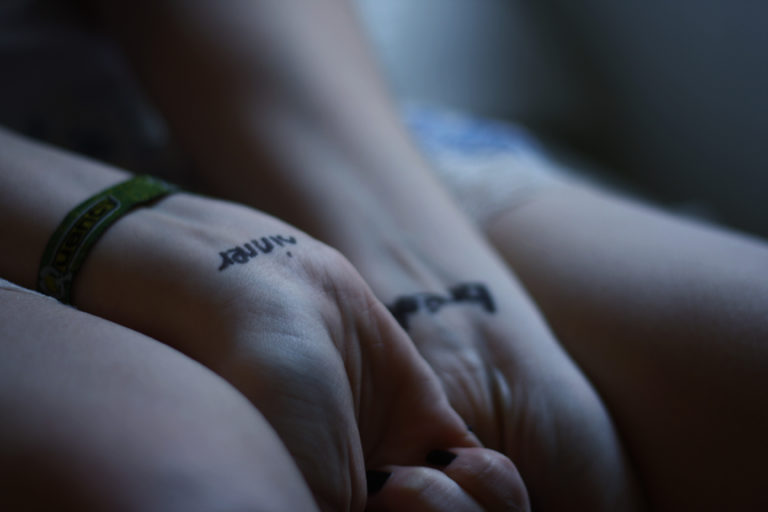
Big yawn. Image by Björn Rixman/Flickr (CC BY 2.0)..
Learning to Self-Soothe and Surrender
Four months hit and Maya forgot how to sleep. I would put her down, answer an email, extract the dirty onesies and burp cloths from her diaper bag and throw them into the hamper, sit down to dinner, and as soon as I held my fork up to my mouth, the whimper sounded. Stomachs dropped. John and I exchanged defeated looks. The whimper evolved into a full-blown cry.
“You want me to go?” he asked, dutifully.
“No,” I said, “I’ll just feed her.”
What saved me during these dark nights of the soul is what has always saved me, actually — wonder. I would sit in the blue absence and rock ever so slightly while Maya nursed away and ponder questions much bigger than my little life, my little family, our little — albeit sometimes torturous — predicament. The one that I’m really fixated on even these six months later is: how does a person learn to self-soothe?
As we’d been debating the various “sleep training” methods, a therapist friend said that she sees people all day long in her office — beautiful people ravaged by drug addiction and violent outbursts — who have never learned to self-soothe. They lose their tempers. They destroy relationships, careers, reputations. They break their own hearts. To my wise friend, sleep training is the first moment when you commit to making sure that your kid will know how to take deep breaths when the going gets rough. Or take a walk. Or say a prayer. Or get a mantra, or whatever else is necessary to back off from oblivion.
That, above all else, above the sleeplessness and the frustration even, convinced me to tolerate the excruciating physiological angst that I feel when my daughter cries. If she needs to cry in order to taste discomfort and understand there is life after it, than I will be uncomfortable with her, for her.
We have a video monitor, so I have actually been able to watch my baby girl learning her own way around discomfort. She does things with her little, pudgy, perfect body that I never could have done for her or taught her to do — barrel rolls around, props her feet up on the side of the crib, babbles with great seriousness to her imaginary audience. My nephew, too, surprised his parents with his soothing techniques. For months on end, when they went to get him from his crib, whether he was crying rivers of tears or just smiling, he had his hands perfectly positioned behind his head, like an old man soaking up some rays on the Coney Island board walk.
It’s been a bit of a revelation for me. We all have our ways to feel okay in the world. Some of us whistle. Some of us smoke. Some of us carry a stone in a pocket. Some of us maniacally refresh Facebook. Some of us pray. Some of us eat. Some of us walk. Some of us work. Some of us run away.
I’ve been reflecting on my own attempts to make the world less overwhelming, less cruel…well, just less of everything. I work. Too much. Feeling productive and efficient are strange balms. I drink a cup of coffee. I like the ritual of making it, the feeling of the warm mug cupped in my hands. It separates what came before and what will come after — a new start, a little help. I shower in the dark. I smother my face in the fur of my tortoise shell cat, coiled up in a patch of sunlight on the couch. I read — there is nothing like a well articulated, fresh idea to shift my mood.
Some of my techniques are largely unconscious. In the early aughts I broke into the spoken word poetry scene in the Lower East Side of New York City. It was a terrifying moment for me, climbing onto the little black platform at the Nuyorican Poets Café, grabbing the standing mic stand, staring out at a sea of skeptical faces, and recalling words that had sounded so right in a dorm room the night before but now seemed tragically naïve. In order to get through it, I yawned. Right before I’d go on stage, I would yawn and yawn and yawn; it was my way of trying to trick myself: “This is so not a big deal that I’m falling asleep.”
At night, I observe my daughter developing the first miniature moves of a self-soothing repertoire and during the day, I walk around looking at people through more compassionate eyes. I see the guy on BART, suited up on his way to work, and think,
“How do you self-soothe? When did you learn to do that?”
I see the gangly high school kids walking up my block towards Oakland Tech and I can almost read the discomfort hanging like a bright aura around their bodies and I wonder how they’re coping. Do they draw on the same well that was first dug those difficult days when they were barrel rolling around their own cribs?
Even my husband gets a softer gaze from me these days. It used to drive me crazy that he whistled when there was tension between us. How can he whistle at a time like this! I would scream in my head. But now I realize that it is his way of self-soothing, of reassuring himself that this too shall pass.
Ian Maclaren, a Scottish theologian, wrote, “Be kind, for everyone you meet is fighting a hard battle.” We are all fighting, indeed, but it’s not as external a battle as it seems. So much of it isn’t fight at all; it’s surrender. Surrender to sleep. Surrender to discomfort. Surrender to what it is. Surrender to our own greatness. Surrender to love. In truth, it’s not as epic as a battle; it’s a million little moments when we do our best to draw on our own sensory genius, our own self-awareness, our own faith, to feel okay in the world. It’s as tiny as a chubby baby in footie pajamas, finally, by the grace of her own persistent ingenuity, peacefully asleep.

